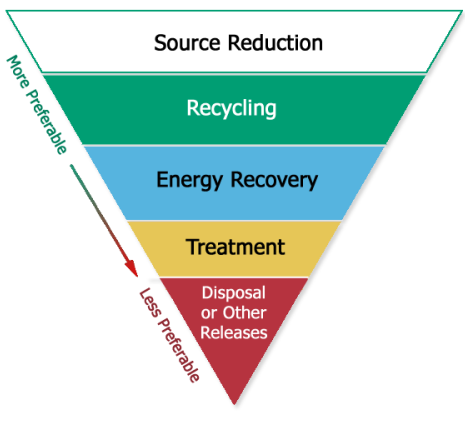Production Related Waste Management for Selected Chemical
lchemid=0000067561
Waste Management Comparison - 2020
Pollution Prevention Activities for Selected Chemical
| Reporting Year | Section 8.10: Newly Implemented Source Reduction Activity | Section 8.10: Methods to Identify Activity | Section 8.11: Optional Pollution Prevention Information* |
|---|---|---|---|
| 2019 |
Source Reduction:: W14: Changed production schedule to minimize equipment and feedstock changeovers
|
Methods to Identify SR Opportunities: T01: Internal pollution prevention opportunity audit(s)
|
W14: Improved Production planning reduced the number of product changeovers Source Reduction - Site has implemented a continuous Improvement process. Ideas form operating personnel are reviewed and implemented as practicable |
| 2018 |
Source Reduction:: W14: Changed production schedule to minimize equipment and feedstock changeovers
|
Methods to Identify SR Opportunities: T01: Internal pollution prevention opportunity audit(s)
|
W14: Better production planning reduced number of switchovers Source Reduction - site employs a continuous improvement process. Ideas are generated by employees, evaluated and implemented as feasible Source Reduction: Source Reduction - Review of operational practices to reduce volume of material required to clean lines |
| 2017 |
Source Reduction:: W63: Modified containment procedures for cleaning units
|
Methods to Identify SR Opportunities: T04: Participative team management
|
W63: Reduced amount of material used to flush lines Source Reduction - Audits are routinely completed around the plant Source Reduction: Source Reduction - Review of operational practices to reduce the volume of material required to flush lines |
| 2016 |
Source Reduction:: W14: Changed production schedule to minimize equipment and feedstock changeovers[-0-4%]
|
Methods to Identify SR Opportunities: T04: Participative team management
Methods to Identify SR Opportunities: T01: Internal pollution prevention opportunity audit(s) |
W14: Facility has implemented a continuous improvement process that employs a cross functional team to evaluate source reduction ideas and suggestions Source Reduction - Facility has implemented a continuous improvement process that employs a cross functional team to evaluate source reduction ideas and suggestions Source Reduction - Facility has implemented a continuous improvement process that employs a cross functional team to evaluate source reduction ideas and suggestions |
| 2015 |
Source Reduction:: W14: Changed production schedule to minimize equipment and feedstock changeovers
|
Methods to Identify SR Opportunities: T01: Internal pollution prevention opportunity audit(s)
|
W14: Facility has implemented a Continuous improvement process that employs a cross functional team to evaluate ideas and suggestions. Source Reduction - Cross functional team evaluated and implements as required all continuous improvement opportunities. |
| 2014 |
Source Reduction:: W14: Changed production schedule to minimize equipment and feedstock changeovers[-0-4%]
|
Methods to Identify SR Opportunities: T04: Participative team management
|
|
| 2013 |
Source Reduction:: W14: Changed production schedule to minimize equipment and feedstock changeovers
|
Methods to Identify SR Opportunities: T04: Participative team management
Methods to Identify SR Opportunities: T05: Employee recommendation (independent of a formal company program) |
Other Environmental Practices - Honeywell utilizes the Honeywell Operating System. As part of the process all employees are engaged in continuous improvement efforts to increase production efficiencies, reduce waste and minimize operating expenses. Source reduction activities are an integral part of HOS. |
| 2012 |
Source Reduction:: W14: Changed production schedule to minimize equipment and feedstock changeovers
|
Methods to Identify SR Opportunities: T04: Participative team management
Methods to Identify SR Opportunities: T05: Employee recommendation (independent of a formal company program) |
|
| 2011 |
Source Reduction:: W14: Changed production schedule to minimize equipment and feedstock changeovers
|
Methods to Identify SR Opportunities: T04: Participative team management
Methods to Identify SR Opportunities: T05: Employee recommendation (independent of a formal company program) |
|
| 2010 |
Source Reduction:: W14: Changed production schedule to minimize equipment and feedstock changeovers
|
Methods to Identify SR Opportunities: T04: Participative team management
Methods to Identify SR Opportunities: T05: Employee recommendation (independent of a formal company program) |
|
| 2005 |
Source Reduction:: W55: Changed from small volume containers to bulk containers to minimize discarding
|
Methods to Identify SR Opportunities: T04: Participative team management
|
TRI Pollution Prevention Glossary
The Waste Management Hierarchy |
The waste management hierarchy established by the Pollution Prevention Act (PPA) guides waste generators toward the best options for managing wastes.
The preferred option is to prevent pollution at its source, but for waste that is generated, the preferred management methods are recycling, followed
by burning for energy recovery, treatment and, as a last resort, disposing of the waste.
|
- A breakdown of production-related waste managed. This includes all amounts of the chemical released directly to the environment or otherwise managed as waste, other than waste generated by one-time events not associated with normal production processes (e.g., fires or remedial actions).
- A production ratio or activity index to provide context for reported toxic chemical quantities. For example, if a chemical is used in the manufacture of refrigerators, the production index would track the number of refrigerators produced and could be used to help gauge how much of the chemical is being released per unit of production.
- Any newly implemented source reduction activities, reported using "W-codes" (e.g., "W41: Increased purity of raw materials")